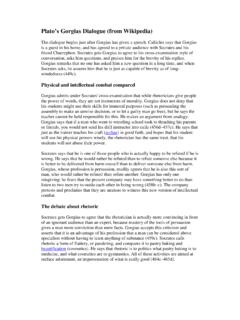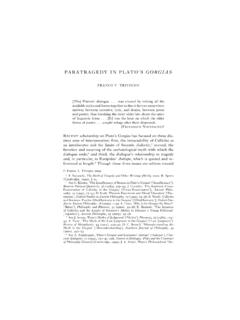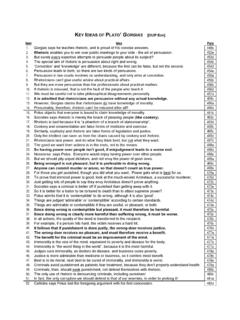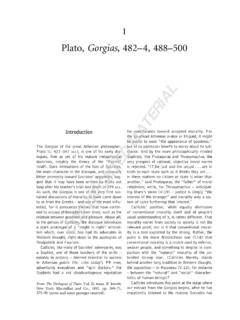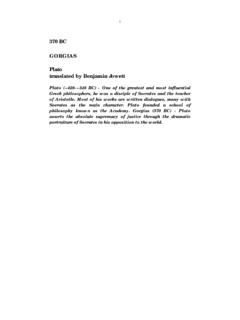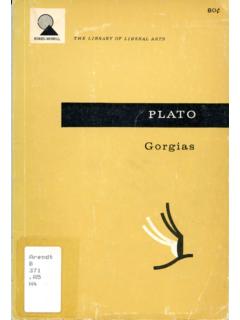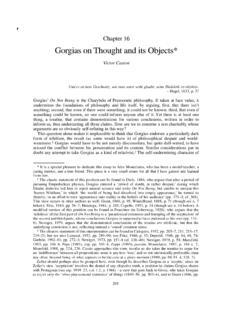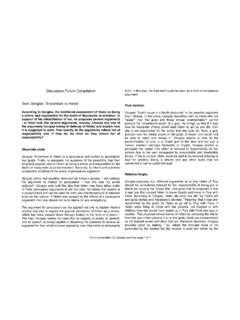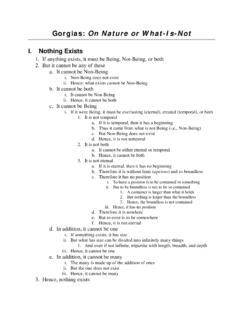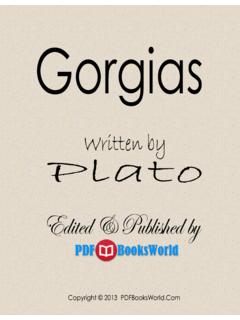Transcription of Gorgias and the Impossibility of Saying Anything
1 Gorgias and the Impossibility of Saying Anything The fifth-century sophist Gorgias is infamous for Saying that nothing exists, and even if it does, it cannot be known, and furthermore, if known, cannot be revealed or communicated to another. This radical, tripartite claim appears in both of the two paraphrases of his controversial treatise On Non Being which have come down to us. In the version found in the first century CE Peripatetic manuscript, On Melissus, Xenophanes, and Gorgias (980a19), the ancient sophist gives a two-part explanation for why even if we concede that something does exist and can be known, it nevertheless cannot be communicated. More than simply highlighting a kind of subjectivity or what Bruce McComiskey has labeled epistemological relativity (2002, 34-8), and far from what Robert Wardy earlier maintained to be just part of an overall strategy to subvert Eleatic monism (1996, 14-24), Gorgias explanation taps deeply into the intrinsic structure of language, raising problems not satisfactorily dealt with until into the twentieth century, most notably through Jacques Derrida s notion of iterability and Ludwig von Wittgenstein s attack on the idea of a private language.
2 According to Gorgias , one reason language cannot communicate is because things are simply not words: language or logos has its own unique ontology completely different from that of material objects and that is moreover apprehended through a different sense mechanism. This observation (which also appears in the paraphrase found in Sextus Empiricus) emphasizes the gap between the word and its referent and the incommensurability between language and reality that constitute the fundamental problem of representation when it comes to words. In his preceding longer explanation, the sophist makes the more subtle distinction of separating the signifier (or the audible portion of the sign/word) from its possible signified (the concept with which it is connected) and proposes that language cannot communicate because no two people can have exactly the same thought or concept (signified) in mind when a word (signifier) is uttered, and furthermore, even the same person at different times will conceive the same word differently.
3 This, he says, is because it is logically impossible for the same thing to exist in two different places at one time, for if it did, then it would be not one thing, but more than one. Gorgias thus shows that language or logos presents a unique permutation of the problem of identity or of the one and the many in part at least because words are repeated. In his 1972 essay Signature Event Context, Jacques Derrida describes the inherent nature of the sign or word as repeatable, able to detach from one context and re-graft into countless others. He shows how this phenomenon, which he terms iterability, guarantees that a sign is never completely identical to itself but contains within it alterity and so is subject to alteration through context. No two iterations of a word are therefore ever the same and duplication implies duplicity.
4 Thus in dealing with language, Derrida, like Gorgias , wrestles with sameness and difference, the one and the many, in attempting to find a way to reconcile these. While Gorgias radical stance precludes all meaningful communication, demonstrating the Impossibility of Saying Anything , Derrida demonstrates that since we must use words which are by their very nature irreducibly ambiguous and radically unstable, we always communicate both less and more than is intended. The sophist s second claim that a word is never the same twice for even the same person keys into this phenomenon of iterability as put forth by Derrida in an additional way; if true, Gorgias statement would seem to preclude not only meaningful public communication, but also the idea of a private language as endorsed by Cambridge language philosopher Bertrand Russell and refuted by his younger colleague Ludwig von Wittgenstein in his Philosophical Investigations [Sections 243-315] published posthumously in 1953.
5 Wittgenstein posits that a language consisting of terms whose meanings are accessible to the speaker alone and therefore unteachable and untranslatable to another could not exist; it would be incomprehensible to even its inventor as it would not allow stable usages for words to be established. As Richard Floyd, faintly echoing the ancient sophist, remarks, Such a language is not only impossible, even if it were possible, it would be useless (2008, 19). Thus in Gorgias On Non Being we find, albeit in embryonic form, definite intimations of both Derrida s notion of iterability and Wittgenstein s attack on the idea of a private language. Bibliography Floyd, Richard, 2006. Wittgenstein. Philosophy Now. Vol. 54, pp 19-21. McComiskey, Bruce. 2002. Gorgias and the New Sophistic Rhetoric.
6 Carbondale: Southern Illinois University Press. Wardy, Robert. 1996. The Birth of Rhetoric: Gorgias , Plato, and their Successors. London and New York: Routledge.
